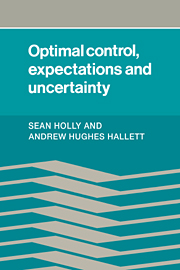Book contents
- Frontmatter
- Contents
- Preface
- 1 Introduction
- 2 The theory of economic policy and the linear model
- 3 Optimal-policy design
- 4 Uncertainty and risk
- 5 Risk aversion, priorities and achievements
- 6 Non-linear optimal control
- 7 The linear rational-expectations model
- 8 Policy design for rational-expectations models
- 9 Non-cooperative, full-information dynamic games
- 10 Incomplete information, bargaining and social optima
- Notes
- References
- Index
10 - Incomplete information, bargaining and social optima
Published online by Cambridge University Press: 17 September 2009
- Frontmatter
- Contents
- Preface
- 1 Introduction
- 2 The theory of economic policy and the linear model
- 3 Optimal-policy design
- 4 Uncertainty and risk
- 5 Risk aversion, priorities and achievements
- 6 Non-linear optimal control
- 7 The linear rational-expectations model
- 8 Policy design for rational-expectations models
- 9 Non-cooperative, full-information dynamic games
- 10 Incomplete information, bargaining and social optima
- Notes
- References
- Index
Summary
INTRODUCTION
In chapter 9 we considered non-cooperative, full-information games; that is, competitive decision-making in which privately optimal solutions were sought by private agents. The macroeconomic policy-maker, who was also assumed to have full information, pursued his own optimal policy. The objective function lying behind this policy may have elements of Bergsonian social welfare, with policy-makers maximising the utility of the representative individual. But it may be that other considerations are also important here.
The information that is needed to be able to make an optimal choice can sometimes be very onerous. In competitive, atomistic markets, because agents can make their optimal choice solely on the basis of relative prices, the information needed to make decisions is comparatively small. At the other extreme of competitiveness, the monopolist needs only to know the slope of the demand curve facing him, as well as the vector of relative prices, to be able to make optimal decisions. The difficulties lie in between these two extreme cases where conditions of oligopoly obtain. The analysis of decision-making is much less straightforward, not because the usual marginal conditions for the optimal choice do not apply, but because an agent has to know how other agents will respond to what he does himself and then know how to respond in turn to this. The information requirements here are overwhelming.
There may be incomplete information not only about the performance of the economy but also about the intentions of both private agents and the government.
- Type
- Chapter
- Information
- Optimal Control, Expectations and Uncertainty , pp. 197 - 226Publisher: Cambridge University PressPrint publication year: 1989



